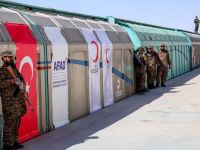China on Tuesday declined to confirm or deny if it had resumed a dialogue with exiled Tibetan spiritual leader the Dalai Lama after a two-year freeze.
But while refusing to comment on the Dalai Lama's statement Monday that his elder brother made a secret visit to Beijing, China reiterated its stance that channels of communication between the sides were available.
"I would like to reaffirm here that there are channels for contact between China and the Dalai Lama," foreign ministry spokeswoman Zhang Qiyue said during the ministry's regular briefing.
Asked if she was denying the Dalai Lama's brother visited the Chinese capital, Zhang replied: "You can interpret it in your way."
At a press conference on Monday marking the 50th anniversary since he assumed the role of Tibetan head of state, the Dalai Lama said his brother, Gyalo Thondup, traveled to Beijing in late October at the instigation of the Chinese authorities.
He returned with a message from Beijing, the details of which the Dalai Lama refused to disclose.
"I then sent a message to China, saying I wanted to send some sort of delegation," the Dalai Lama said. "The final response has not come yet."
Formal contact between the Dalai Lama and Beijing, through the Chinese embassy in New Delhi, was cut in 1993.
Informal links were maintained, but then severed completely by Beijing in November 1998.
The Dalai Lama on Monday said it was "too early to say" if the dialogue might lead to a Chinese change of heart, and the Chinese foreign ministry on Tuesday gave no indication of any reversal of policy on Tibet.
Chinese spokeswoman Zhang reiterated that in order for the Dalai Lama to enter into negotiations with China, he must "truly give up Tibetan independence, stop activities aiming at splitting China and openly declare that Tibet is an inalienable part of Chinese territory."
He must also declare that Taiwan is part of China and that the government in Beijing is the sole legitimate government of all China, Zhang said.
"If the Dalai Lama can accept all these conditions, then the central government is willing to have contact with him and negotiations with him," she said.
Despite the Dalai Lama's repeated assertions that he is not seeking independence for Tibet, he is repeatedly vilified by Chinese officials in vitriolic language as devious and insincere separatist.
The Dalai Lama fled Tibet in 1959 following a failed uprising against Chinese rule, and set up a government-in-exile in the northern Indian hill station of Dharamsala.
The Dalai Lama on Monday said he had asked his brother to travel around Tibet during his trip to China, but that he was prevented from doing so by the Chinese authorities.
Refusing to give any further details of the messages sent between Dharamsala and Beijing, he said it was sometimes better "to keep things low key" -- BEIJING (AFP)
© 2000 Al Bawaba (www.albawaba.com)







